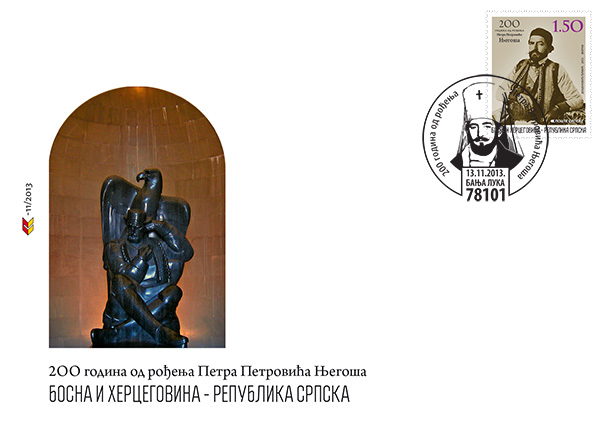200 years from the birth of Petar Petrovic Njegos
Title::200 years from the birth of Petar Petrovic Njegos
Date of Issue:13.11.2013.
Author:Djumic/Dosenovic
Type edition:commemorative
Printing techniques:multicolour offset
Sheet:8+1
Paper:muflep 100g
Printing House:Forum, Novi Sad
 Motive:Njegos
Motive:Njegos
Catalogue no.:611
Perforation:13 3/4
Face value:1,50 BAM
Quantity:15 000

Bishop Petar II Petrovic was born on Njegusi in November 1813, the second son of Toma Markov Petrovic, the youngest brother of Bishop Peter I and Ivana Prorokovic. After he was baptized with the name Radivoje under what is popularly known, and later as Bishop Rade. After he became bishop, he just signed his monk's name - Peter and surname - Petrovic: Bishop Petar Petrovic.
Njegos began writing as a young boy. They were short and meaningless songs in the spirit of folk songs, often sung with the harp. Sima Milutinovic in his collection of folk songs entered five of the alleged Njegos`s songs. Later, in 1834, he published two collection of poems, where there are a few songs which are already looming ingenious poet “Luce Microcosme” and “Gorski vijenac”. His works have been translated into several languages , including Japanese ( "Gorski vijenac" , "Luce Microcosme" ) . "Gorski vijenac" in French reworked Biljana Janevska , in the ten.
Njegos was both a religious and secular leader of the Serbian people in Montenegro, where there was a strong sense of national identity and patriarchal morality, but where there was domestic anarchy , tribal rivalry and vendetta . When he came to power, he immediately started to impose order and modernize the society and the state. He built the schools, founded judgments, made roads, gradually taking all the power in their hands and introduced taxes. In a culturally backward middle it went hard and it had to hurt this great patriot, who has his soul was delivered to the people. "I am the ruler among the barbarians and barbarian among the rulers," he wrote.
In the spring 1850 he became ill with breast disease which in vain for a cure in Italy, and from which he died on 10th of October in 1851 in Cetinje. When Austria in World War won Montenegro, the Governor-General von Weber transferred the bones of Njegos to Cetinje, which was done on 12th August 1916.
Author: Nebojsa Djumic and МА Bozidar Dosenovic
Publisher: Poste Srpske a.d. Banjaluka
 1371
1371  kontakt@postesrpske.com
kontakt@postesrpske.com


